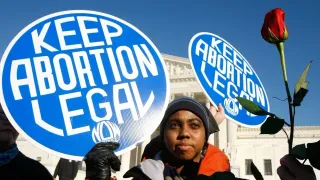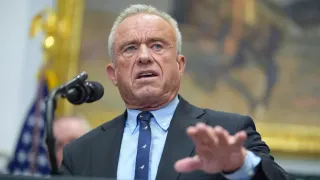June 23, 2022
Review: 'Menudo: Forever Young' a Detailed Look Inside 'Menudo Mania'
JC Alvarez READ TIME: 3 MIN.
The Latin music explosion of the '90s that included Jennifer Lopez and Ricky Martin was preceded by another pop music movement when the Puerto Rican boy band Menudo, which Martin had been a part of, arrived on the scene in the late '70s and immediately won the hearts (and libidos, really) of teenage girls all over the country. The five band members would become the names and faces of Puerto Rico and would transcend iconic popularity, but what few had ever known was that inside the rise of Menudo and into the band's continued evolution was a sinister web of abuse that hinged on a false promise and banked on greed.
The band was the brainchild of Edgardo Díaz, an ambitious music producer and promoter who recognized a vacuum in the market and especially in his own native Puerto Rico and immediately went to work to address it. After spending some time managing other popular pop acts, Díaz realized that in order to capitalize on the untapped market they would appeal to kids directly. He assembled a group of five young performers, all boys, and made it a rule that there would not be any girls in his band –�a rule specifically meant to target and appeal to young girls. Apart from that, there would be only one rule: Whatever Edgardo Díaz said goes!
From the beginning, Díaz made it apparent to the band members that they could and would be immediately replaced. It all started with local live appearances. Menudo, as he named the band (amply translated into "little change"), would perform across the island of Puerto Rico and at any venue that would have them. Díaz worked the youngsters around the clock, and eventually it paid off. After booking countless local festivals, the original group landed an introduction on a late-night talk show, and their popularity skyrocketed. Determined to make them stars, Edgardo Díaz demanded fealty and would settle for nothing less.
He contracted the band members over-demandingly, and convinced their parents to turn over authority over the five Menudo members to him. As their popularity grew, Menudo became idols in their native Puerto Rico and soon began to take their brand of pop, wrapped in a slightly-too-sexy-for-their-ages image to Latin America, before finally making the break to the mainland United States. Edgardo Díaz's dream of stardom was within reach, but at what cost? He mandated that they should all look under 17, and whether they aged out or just didn't fit the "brand" that he was working to establish they would be immediately and unceremoniously replaced. By the time the band crossed over, Ricky Martin was a recruit and they were viewed as an instant commodity.
Menudomania hit here in the late '70s and into the '80s, and their branding power was explosive. They worked feverishly and performed tirelessly, making every tour date and commercial shoot. While Díaz filled his pockets building his empire, the boys saw little profit, aside from their fan adulation. To make matters worse, the parents feared that Díaz was working them too hard, and when they complained they would be effectively removed. The train was on the tracks and Edgardo Díaz was fully in control, and the world behind the scenes was filled with all manner of sex, drugs, and rock and roll not becoming of a heartthrob boy band.
Scandals inevitably followed, along with accusations of mismanagement and abuse, but Díaz was untouchable. A bubble protected him and his inappropriate antics. Over the course of its 20-year history, Menudo had 32 members.
By the late '90s, the latest lineup of the band was hardly making the millions or drawing the record audiences as in the early days. Their budgets were slashed, but the workload persisted, and the expectation that the group deliver continued even as Díaz's empire continued to crumble.
With first-hand accounts from band members from across the various incarnations, and individuals who had followed the controversies and reported on the abuses, the HBO Max four-part documentary series is revelatory and frightening. Told from many perspectives and from the band's experience, including several individuals who were there, the documentary details to horrors associated with pursuing celebrity and should serve as a cautionary tale. Though Díaz was never found responsible for the alleged abuse, there was just too much smoke to ignore this fire.
There's no doubt that Menudo was the template for many of the boy bands and pop acts that would emerge in the late '80s and '90s, and if they proved anything it's how they transcended, paving the way for LatinX artists to seek their place in the spotlight.
"Menudo: Forever Young" premieres on HBO Max on Thursday, June 23.







